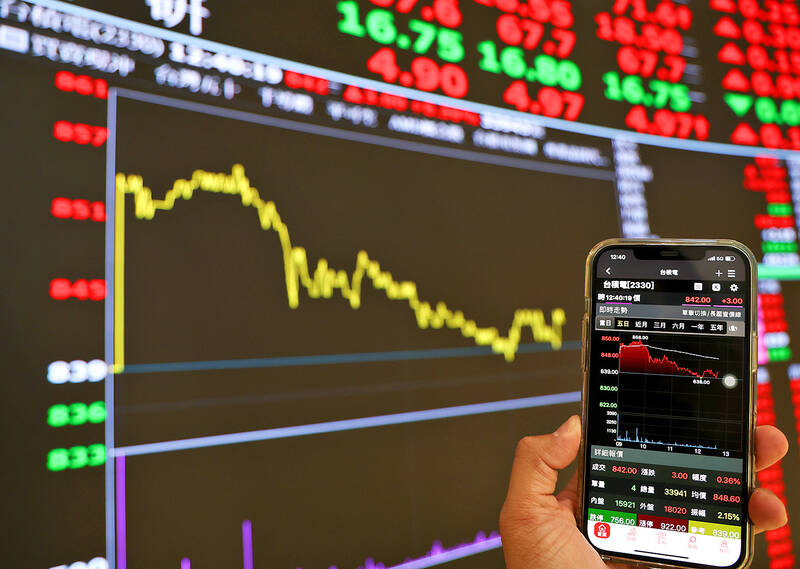The nation’s securities account balance last month plunged NT$137.3 billion (US$4.26 billion) to NT$3.3 trillion, from a record high of NT$3.51 trillion in March, as fast and deep TAIEX corrections took a toll on investment sentiment, the central bank said on Friday.
The benchmark saw sharp retreats in the middle of last month after Taiwan Semiconductor Manufacturing Co (TSMC, 台積電), the world’s largest maker of advanced chips, gave a lackluster outlook for global chip demand this year, but stood by its own earnings ability.
The remarks set off panic sell-offs and capital outflows in the following days, as tech analysts had forecast TSMC would raise capital expenditures on the back of strong demand from artificial intelligence (AI) and other emerging technologies.

Photo: CNA
Further, brief military conflicts between Iran and Israel stirred up unease that the war in the Gaza Strip would escalate and spread across the Middle East, central bank research official Tsao Ti-jen (曹體仁) told a news conference in Taipei.
The stock rout reversed toward the end of last month after several US technology giants during earnings calls said they would increase their AI investments, although the spending might not bear fruit in the near future.
The TAIEX on Friday closed down 0.19 percent to 21,565.34 points, significantly different from 19,527.12 on April 19, the day after TSMC investors’ conference, Taiwan Stock Exchange data showed.
The central bank’s latest data reflected that stock market sentiment remained bullish in the first four months of the year, as the TAIEX averaged 20,245 last month, up from 19,843 points in March, 18,612 points in February and 17,668 points in January.
In addition, the balance of margin loans spiked to NT$384.2 billion last month, up from NT$379 billion the previous month and hitting the highest level since February 2011, the central bank said.
New Taiwan dollar deposits by foreigners rose 12.19 percent to NT$220.9 billion last month, as some opted to park money in Taiwan, Tsao said, adding that cash dividends helped boost the balance.
Against that backdrop, the annual growth in the narrow money supply measure of M1B — which refers to money in circulation, including currency and passbook savings deposits — slowed to 4.94 percent last month, from 5.38 percent in March, the central bank said.
Likewise, the increase in the broad reading of M2 — which includes time deposits, time-saving deposits, foreign currency deposits, mutual funds and M1B — eased to 6.06 percent from 6.15 percent the previous month, it said.

Intel Corp chief executive officer Lip-Bu Tan (陳立武) is expected to meet with Taiwanese suppliers next month in conjunction with the opening of the Computex Taipei trade show, supply chain sources said on Monday. The visit, the first for Tan to Taiwan since assuming his new post last month, would be aimed at enhancing Intel’s ties with suppliers in Taiwan as he attempts to help turn around the struggling US chipmaker, the sources said. Tan is to hold a banquet to celebrate Intel’s 40-year presence in Taiwan before Computex opens on May 20 and invite dozens of Taiwanese suppliers to exchange views

Application-specific integrated circuit designer Faraday Technology Corp (智原) yesterday said that although revenue this quarter would decline 30 percent from last quarter, it retained its full-year forecast of revenue growth of 100 percent. The company attributed the quarterly drop to a slowdown in customers’ production of chips using Faraday’s advanced packaging technology. The company is still confident about its revenue growth this year, given its strong “design-win” — or the projects it won to help customers design their chips, Faraday president Steve Wang (王國雍) told an online earnings conference. “The design-win this year is better than we expected. We believe we will win

Chizuko Kimura has become the first female sushi chef in the world to win a Michelin star, fulfilling a promise she made to her dying husband to continue his legacy. The 54-year-old Japanese chef regained the Michelin star her late husband, Shunei Kimura, won three years ago for their Sushi Shunei restaurant in Paris. For Shunei Kimura, the star was a dream come true. However, the joy was short-lived. He died from cancer just three months later in June 2022. He was 65. The following year, the restaurant in the heart of Montmartre lost its star rating. Chizuko Kimura insisted that the new star is still down

While China’s leaders use their economic and political might to fight US President Donald Trump’s trade war “to the end,” its army of social media soldiers are embarking on a more humorous campaign online. Trump’s tariff blitz has seen Washington and Beijing impose eye-watering duties on imports from the other, fanning a standoff between the economic superpowers that has sparked global recession fears and sent markets into a tailspin. Trump says his policy is a response to years of being “ripped off” by other countries and aims to bring manufacturing to the US, forcing companies to employ US workers. However, China’s online warriors